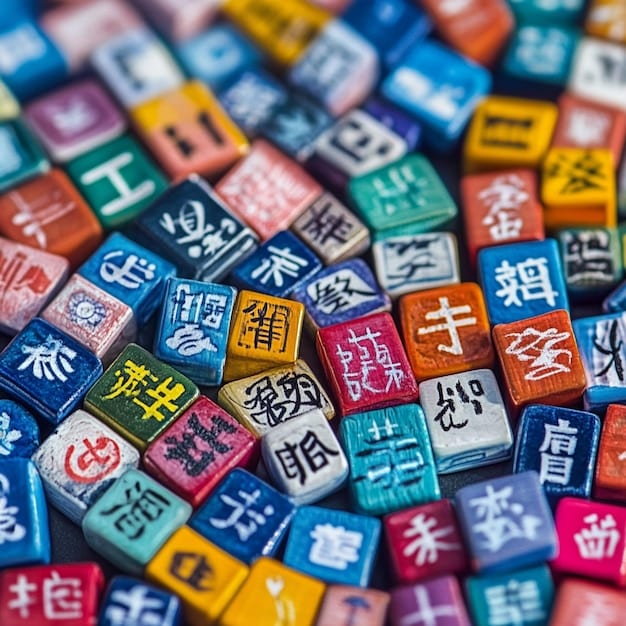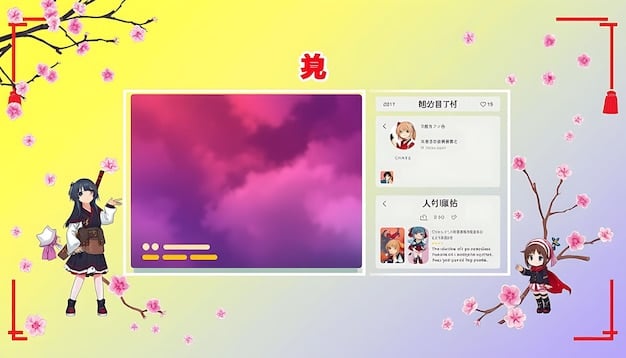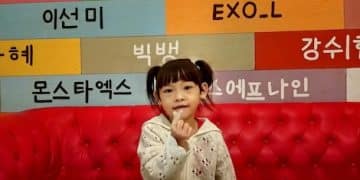Chinese Drama Slang 101: Learn Phrases & Impress Friends

Advertisements
Unlock the world of Chinese dramas by mastering essential slang! This guide covers popular phrases that will help you understand and appreciate the nuances of Chinese pop culture, making you feel like a true insider.
Ready to level up your C-drama watching experience? Learning a bit of slang can make all the difference. This guide, Chinese Drama Slang 101: Master These Phrases and Impress Your Friends, will introduce you to common terms that aren’t always found in textbooks.
Anúncios
Decoding Chinese Drama Lingo: Your Ultimate Guide
Chinese dramas, or C-dramas, have exploded in popularity, captivating audiences worldwide with their compelling storylines, stunning visuals, and talented actors. But beyond the engaging plots, a unique layer of slang and expressions adds depth and authenticity. This guide helps you understand some lingo.
Understanding these phrases not only enriches your viewing experience but also provides a glimpse into the everyday language and culture of China. Get ready to impress your friends with your newfound knowledge of C-drama slang!
Anúncios
Why Learn C-Drama Slang?
There are many reasons to learn common slang phrases if you enjoy C-dramas.
- Enhanced Understanding: Slang often carries subtle cultural nuances and emotions that formal language can miss, providing a deeper understanding of the characters and their relationships.
- Authenticity: By understanding slang, you’ll better grasp the dialogues and appreciate the scenarios as they are intended to be.
- Cultural Connection: Learning slang connects you to the culture behind the dramas, making your viewing experience more immersive.
- Impress Your Friends: Demonstrate your advanced knowledge of C-dramas and Chinese culture by using slang appropriately in conversations.
Learning slang is a fun way to immerse yourself in the language.
Essential Slang Words and Phrases
Let’s dive into some of the most popular slang terms you’ll encounter in Chinese dramas. Understanding these phrases will greatly enhance your ability to pick up on nuances of emotion, comedy, and drama.
These terms are used commonly and can make you feel like a true insider.

高富帅 (Gāo Fù Shuài)
This term is often used to describe the ideal man, referring to someone who is tall, rich, and handsome.
It’s a common descriptor in dramas, particularly when discussing a male lead.
白富美 (Bái Fù Měi)
The female equivalent of 高富帅, this term describes a woman who is fair-skinned, rich, and beautiful.
Like 高富帅, it’s a popular descriptor for female leads, often representing a character who seems to have it all.
- 高 (Gāo): Tall
- 富 (Fù): Rich
- 帅 (Shuài): Handsome
- 白 (Bái): Fair-skinned
- 美 (Měi): Beautiful
Together, these words create vivid and popular descriptions.
Common Expressions in C-Dramas
Beyond single-word slang, C-dramas feature frequently used expressions that add flavor and depth to the dialogues. Familiarizing yourself with these expressions can make the viewing experience far more engaging.
These expressions range from playful banter to heartfelt confessions.
加油 (Jiā Yóu)
Literally meaning “add oil,” this expression is used as a form of encouragement, similar to saying “come on,” “go for it,” or “you can do it.”
It’s a versatile phrase used in various scenarios, from cheering on a friend in a competition to motivating oneself during a challenging task.
随便 (Suí Biàn)
Meaning “whatever” or “anything goes,” this expression is used to indicate a lack of preference or to express indifference.
Be mindful of the context, as it can sometimes be used sarcastically or dismissively, not always indicating genuine flexibility.
- Jiā (加): Add
- Yóu (油): Oil
- Suí (随): Follow
- Biàn (便): Convenient
The combinations of these words create useful everyday expressions.
Online Slang and Internet Terms
The internet has significantly influenced language, and Chinese is no exception. Online slang and internet terms are frequently used in C-dramas, reflecting the digital age. Understanding these terms can help you navigate the dialogues that reference social media, online gaming, or internet culture.
These terms are typically creative and sometimes humorous.
666 (Liù Liù Liù)
This numeric slang is equivalent to “awesome” or “amazing.” The number six is pronounced “liù,” which sounds similar to “溜 (liū),” meaning “smooth” or “skillful.”
Repeating the number three times emphasizes the admiration, making it a popular way to compliment someone’s skill or achievement.
Orz
This is an emoticon that represents a person kneeling, symbolizing helplessness or frustration. It’s a visual shorthand often used in online discussions to express defeat or disappointment.
Keep an eye out for this in chat screenshots or online-themed scenes.

- 6 (Liù): Six
- Orz: Kneeling Emoticon
Use these appropriately and you’ll fit right in.
Terms of Endearment and Relationships
Relationships are central to many C-dramas. Learning the slang terms for relationships and endearment adds emotional depth to your understanding of the characters and their interactions.
These terms are often heart-warming and intimate.
小鲜肉 (Xiǎo Xiān Ròu)
This term translates to “little fresh meat” and refers to young, attractive male celebrities, often with a clean and youthful image. It’s a popular term in fan culture and media.
You’ll often see this term used endearingly toward rising male stars.
女神 (Nǚ Shén)
Meaning “goddess,” this term is used to describe a woman who is exceptionally beautiful and admired. It’s a complimentary term often used by male characters to express their admiration for a female character.
This term carries high praise and admiration.
- 小 (Xiǎo): Little
- 鲜 (Xiān): Fresh
- 肉 (Ròu): Meat
- 女 (Nǚ): Female
- 神 (Shén): God
The descriptions capture key aspects of relationships.
Slang for Describing People and Situations
Being able to describe people and situations accurately is crucial in any language. C-drama slang offers a unique and colorful way to articulate different characteristics and scenarios.
These terms are sometimes comedic and often insightful.
吃瓜群众 (Chī Guā Qún Zhòng)
Literally meaning “melon-eating masses,” this term refers to bystanders or onlookers who are watching a situation unfold, often with amusement or interest. It’s commonly used to describe people observing gossip or drama.
Think of it as being a casual observer with a snack in hand.
无语 (Wú Yǔ)
This term means “speechless” or “at a loss for words.” It’s used to express frustration, disbelief, or exasperation in a situation.
It captures the feeling of being so surprised or annoyed you can’t even speak.
- 吃 (Chī): Eat
- 瓜 (Guā): Melon
- 群众 (Qún Zhòng): Masses
- 无 (Wú): Without
- 语 (Yǔ): Speech
These terms can add nuance and humor to your descriptions.
| Key Phrase | Brief Description |
|---|---|
| 💪 Jiā Yóu | “Add oil”; encouragement similar to “You can do it!” |
| 🤩 Liù Liù Liù | “666”; used to express “awesome” or admiration. |
| 😎 Chī Guā Qún Zhòng | “Melon-eating masses”; bystanders watching drama unfold. |
| 🤔 Wú Yǔ | “Speechless” or at a loss for words; shows disbelief. |
Frequently Asked Questions
▼
Slang provides a more authentic cultural experience, revealing emotions, nuances, and humor that are often missed in formal language translations, deepening your understanding of C-drama plots and character interactions.
▼
By understanding slang, you’ll stay current with evolving language use, improving conversational skills and your ability to interact naturally with native speakers, offering a valuable complement to traditional learning methods.
▼
Yes, misusing slang can sometimes lead to misunderstandings or accidental offense. Always consider context, tone, and audience to keep communication respectful and avoid unintended implications.
▼
Look for online forums, language learning apps, and social media groups dedicated to Chinese language and culture for slang terms and related discussions. Also, pay attention to native speakers to learn in context.
▼
Like any language, Chinese slang changes frequently based on trends. Keep up to date by following media, pop culture, and internet discussions to stay current with new terms and evolving usage.
Conclusion
By familiarizing yourself with these common slang terms and expressions, you’ll not only improve your understanding of C-dramas but also gain a deeper appreciation for Chinese culture and language. So, go ahead, dive into the world of C-dramas with your new vocabulary and impress your friends with your insider knowledge!





